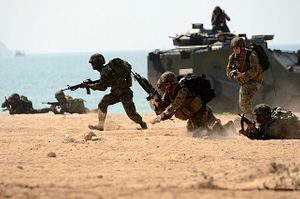Next month, the United States and Thailand will kick off the 2018 iteration of the annual Cobra Gold exercises – an engagement that began as a bilateral drill between the two allies and has now grown into Asia’s largest multinational drill. Though the 37th iteration of exercise, like the ones before it, is first and foremost a showcase of the growing multilateralization of a key defense engagement, like recent years the commentary around it will likely revolve around what this means in the context of the U.S.-Thailand alliance and Thailand’s own future.
Strictly speaking, Cobra Gold is usually comprised of three primary events: a staff exercise, a field training exercise, and humanitarian civic assistance projects in Thai communities. Indeed, some aspects of the last part of the exercise have already begun, with the United States announcing that engineering civic assistance projects kicking off last week in parts of Thailand.
Last year’s Cobra Gold exercises saw 29 countries either directly participating in or observing the exercises (See: “US, Thailand to Launch 2017 Cobra Gold Exercises”). As the planning for this year’s Cobra Gold exercises have gone on, Thai officials have been saying that more personnel and countries – more than 30 of them – will participate this year, though the exact numbers offered have changed. That is far from surprising: while Cobra Gold no doubt has grown in size over the years, following the May 2014 coup, the ruling junta has an even greater incentive to play up the exercise’s status as a means to reinforce Thailand’s strategic importance and the willingness of the international community to engage the country in spite of its domestic troubles.
Despite Cobra Gold being a multinational exercise, much of the focus this year, as it has been over the past few years, will likely be on the level of U.S. involvement in the exercise. The level of U.S. involvement had already been on an uptick after an initial period of downgrading following the May 2014 coup, with the last year’s iteration seeing U.S. Pacific Command chief Harry Harris attending as the highest level of U.S. officer to join the drills since the coup (See: “Exclusive: Managing the Strained US-Thailand Alliance”). But since this Cobra Gold is taking place further into the presidency of Donald J. Trump, it will be seen as a litmus test of where bilateral ties are more so than last year’s.
The Trump administration’s approach to Thailand has already been quite clear, as I have been detailing in these pages (See: “Managing the US-Thailand Alliance in the Trump Era”). The administration has built on the uptick of U.S.-Thailand relations towards the end of the Obama administration and looked to boost bilateral engagements even further, including taking steps that were not taken before like receiving Prime Minister Prayut Chan-o-cha in the White House last October. That has continued this year, which constitutes the 200th anniversary of the establishment of U.S.-Thailand relations, despite continued concerns over the lack of progress on the full restoration of a democratically-elected civilian government.
With respect to Cobra Gold, since late last year, officials have hinted that the level of U.S. participation in Cobra Gold this year will be the largest since the coup. Last week, The Bangkok Post noted that the figure could be around 6,800, though we will likely see a full disclosure of personnel and assets, along with U.S. statements on the direction of the alliance more broadly, as we get closer to the drills. Given what we have seen in past years, one can expect no shortage of scrutiny on Cobra Gold as it gets underway.































